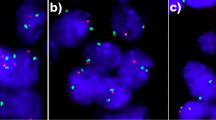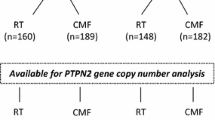Abstract
In a previous retrospective study, we demonstrated the prognostic value of protein tyrosine kinase 6 (PTK6) protein expression in breast carcinomas. Here, we analyzed PTK6 gene amplification using fluorescence in situ hybridization technique in a cohort of 426 invasive breast carcinomas and compared it with PTK6 expression level as well as with the clinical outcome of patients. Forty-five percent of tumors show increased PTK6 gene copy numbers when compared to normal tissue. Most of these, however, were related to chromosome 20 polysomy (30%), while gene amplification accounted for only 15%. Only “low level” amplification of the PTK6 gene, with up to eight signals per nucleus, was found. The PTK6 cytogenetic status (normal, gene amplification, polysomy 20) was not associated with histopathological parameters or with the protein expression of HER receptors. No statistical association was identified between PTK6 gene status and expression level. Further, the PTK6 gene status does not influence the disease-free survival of patients at ≥240 months. Based on these results, we state that the PTK6 overexpression is not essentially attributed to gene amplification, and the PTK6 protein expression—but not gene status—is of prognostic value in breast carcinomas. PTK6 protein overexpression may result from polysomy 20 in a minority of the tumors. In a marked proportion of tumors, however, the overexpression is likely to be caused by posttranscriptional regulation mechanisms.

Similar content being viewed by others
References
Savelyeva L, Schwab M (2001) Amplification of oncogenes revisited: from expression profiling to clinical application. Cancer Lett 167:115–123
Imoto I, Yang ZQ, Pimkhaokham A et al (2001) Identification of cIAP1 as a candidate target gene within an amplicon at 11q22 in esophageal squamous cell carcinomas. Cancer Res 61:6629–6634
Ohta JI, Miyoshi Y, Uemura H et al (2001) Fluorescence in situ hybridization evaluation of c-erbB-2 gene amplification and chromosomal anomalies in bladder cancer. Clin Cancer Res 7:2463–2467
Schwab M (1998) Amplification of oncogenes in human cancer cells. Bioessays 20:473–479
Slamon DJ (1990) Studies of the HER-2/neu proto-oncogene in human breast cancer. Cancer Invest 8:253
Jukkola A, Bloigu R, Soini Y et al (2001) c-erbB-2 positivity is a factor for poor prognosis in breast cancer and poor response to hormonal or chemotherapy treatment in advanced disease. Eur J Cancer 37:347–354
Hsieh AC, Moasser MM (2007) Targeting HER proteins in cancer therapy and the role of the non-target HER3. Br J Cancer 97:453–457
Hahn WC, Weinberg RA (2002) Rules for making human tumor cells. N Engl J Med 347:1593–1603
Schmandt RE, Bennett M, Clifford S et al (2006) The BRK tyrosine kinase is expressed in high-grade serous carcinoma of the ovary. Cancer Biol Ther 5:1136–1141
Mitchell PJ, Barker KT, Martindale JE et al (1994) Cloning and characterisation of cDNAs encoding a novel non-receptor tyrosine kinase, brk, expressed in human breast tumours. Oncogene 9:2383–2390
Barker KT, Jackson LE, Crompton MR (1997) BRK tyrosine kinase expression in a high proportion of human breast carcinomas. Oncogene 15:799–805
Llor X, Serfas MS, Bie W et al (1999) BRK/Sik expression in the gastrointestinal tract and in colon tumors. Clin Cancer Res 5:1767–1777
Born M, Quintanilla-Fend L, Braselmann H et al (2005) Simultaneous over-expression of the Her2/neu and PTK6 tyrosine kinases in archival invasive ductal breast carcinomas. J Pathol 205:592–596
Ostrander JH, Daniel AR, Lofgren K et al (2007) Breast tumor kinase (protein tyrosine kinase 6) regulates heregulin-induced activation of ERK5 and p38 MAP kinases in breast cancer cells. Cancer Res 67:4199–4209
Aubele M, Auer G, Walch AK et al (2007) PTK (protein tyrosine kinase)-6 and HER2 and 4, but not HER1 and 3 predict long-term survival in breast carcinomas. Br J Cancer 96:801–807
Meric F, Lee WP, Sahin A et al (2002) Expression profile of tyrosine kinases in breast cancer. Clin Cancer Res 8:361–367
Derry JJ, Prins GS, Ray V et al (2003) Altered localization and activity of the intracellular tyrosine kinase BRK/Sik in prostate tumor cells. Oncogene 22:4212–4220
Kamalati T, Jolin HE, Fry MJ et al (2000) Expression of the BRK tyrosine kinase in mammary epithelial cells enhances the coupling of EGF signalling to PI 3-kinase and Akt, via erbB3 phosphorylation. Oncogene 19:5471–5476
Zhang P, Ostrander JH, Faivre EJ et al (2005) Regulated association of protein kinase B/Akt with breast tumor kinase. J Biol Chem 280:1982–1991
Petro BJ, Tan RC, Tyner AL et al (2004) Differential expression of the non-receptor tyrosine kinase BRK in oral squamous cell carcinoma and normal oral epithelium. Oral Oncol 40:1040–1047
Haegebarth A, Heap D, Bie W et al (2004) The nuclear tyrosine kinase BRK/Sik phosphorylates and inhibits the RNA-binding activities of the Sam68-like mammalian proteins SLM-1 and SLM-2. J Biol Chem 279:54398–54404
Zhao C, Yasui K, Lee CJ et al (2003) Elevated expression levels of NCOA3, TOP1, and TFAP2C in breast tumors as predictors of poor prognosis. Cancer 98:18–23
Aubele M, Walch AK, Ludyga N et al (2008) Prognostic value of protein tyrosine kinase 6 (PTK6) for long-term survival of breast cancer patients. Br J Cancer 99:1089–1095
Walch A, Bink K, Hutzler P et al (2001) Sequential multilocus fluorescence in situ hybridization can detect complex patterns of increased gene dosage at the single cell level in tissue sections. Lab Invest 81:1457–1459
Al-Kuraya K, Schraml P, Torhorst J et al (2004) Prognostic relevance of gene amplifications and coamplifications in breast cancer. Cancer Res 64:8534–8540
Gorre ME, Mohammed M, Ellwood K et al (2001) Clinical resistance to STI-571 cancer therapy caused by BCR-ABL gene mutation or amplification. Science 293:876–880
Caner V, Turk NS, Duzcan F et al (2008) No strong association between HER-2/neu protein overexpression and gene amplification in high-grade invasive urothelial carcinomas. Pathol Oncol Res 14(3):261–266
Vleugel MM, Bos R, Buerger H et al (2004) No amplifications of hypoxia-inducible factor-1alpha gene in invasive breast cancer: a tissue microarray study. Cell Oncol 26:347–351
Hyun CL, Lee HE, Kim KS et al (2008) The effect of chromosome 17 polysomy on HER-2/neu status in breast cancer. J Clin Pathol 61:317–321
Lal P, Salazar PA, Ladanyi M et al (2003) Impact of polysomy 17 on HER-2/neu immunohistochemistry in breast carcinomas without HER-2/neu gene amplification. J Mol Diagn 5:155–159
Bizari L, Borim AA, Leite KR et al (2006) Alterations of the CCND1 and HER-2/neu (ERBB2) proteins in esophageal and gastric cancers. Cancer Genet Cytogenet 165:41–50
Tovey S, Dunne B, Witton CJ et al (2005) Can molecular markers predict when to implement treatment with aromatase inhibitors in invasive breast cancer? Clin Cancer Res 11:4835–4842
Koutras AK, Fountzilas G, Kalogeras KT et al (2009) The upgraded role of HER3 and HER4 receptors in breast cancer. Crit Rev Oncol Hematol, in press
Pawlowski V, Revillion F, Hebbar M et al (2000) Prognostic value of the type I growth factor receptors in a large series of human primary breast cancers quantified with a real-time reverse transcription-polymerase chain reaction assay. Clin Cancer Res 6:4217–4225
Harvey AJ, Crompton MR (2003) Use of RNA interference to validate Brk as a novel therapeutic target in breast cancer: Brk promotes breast carcinoma cell proliferation. Oncogene 22:5006–5010
Acknowledgements
This project was supported by the Deutsche Krebshilfe, contract 107379, and partly by the European Commisson, “TRANSBIG” Project, no. LSHC-CT-2004-503426. We gratefully acknowledge the excellent technical assistance of Uli Reich and Ilse DiGrazia.
Disclosure of Conflict of Interest
We, the authors, declare that we have no conflict of interest.
Author information
Authors and Affiliations
Corresponding author
Additional information
Statement
Ethical approval for this study was obtained from the Ethics Committee of the Medical Faculty of the Technische Universität München, Germany.
Rights and permissions
About this article
Cite this article
Aubele, M., Vidojkovic, S., Braselmann, H. et al. Overexpression of PTK6 (breast tumor kinase) protein—a prognostic factor for long-term breast cancer survival—is not due to gene amplification. Virchows Arch 455, 117–123 (2009). https://doi.org/10.1007/s00428-009-0809-8
Received:
Revised:
Accepted:
Published:
Issue Date:
DOI: https://doi.org/10.1007/s00428-009-0809-8




